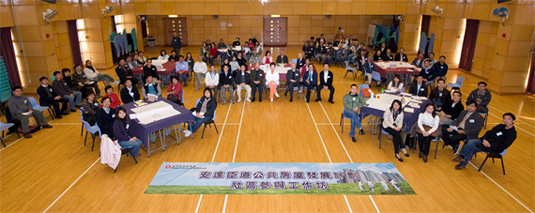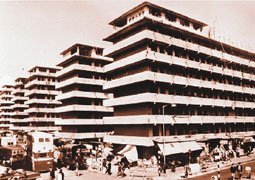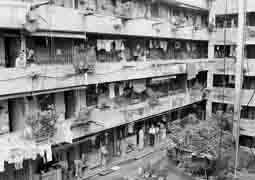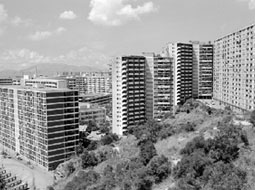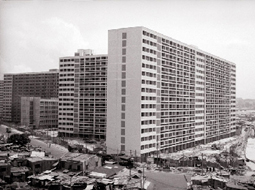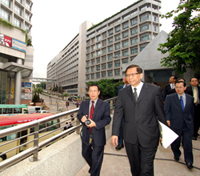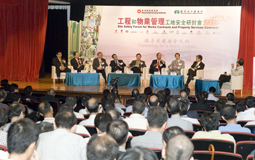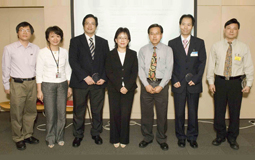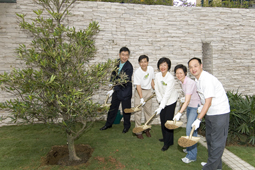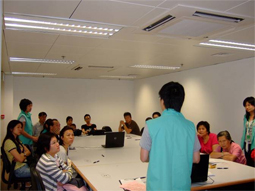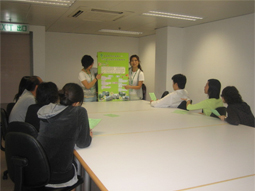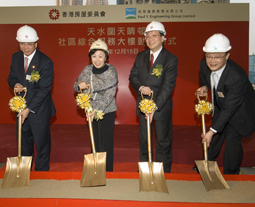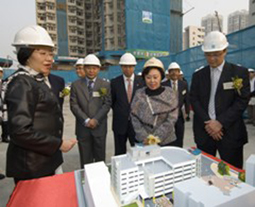Stakeholder Engagement
Sustainability in housing can only be achieved by working hand-in-hand with our stakeholders. From planning, design, construction and management of our estates, we have identified different stakeholders who share different interests. To proactively engage them and understand their expectations, as well as letting them understand the rationale behind our decisions, we have organised various engagement initiatives.
| Stakeholder Engagement Targets for 2008/09 | Progress |
|---|---|
| Conduct various initiatives for our staff, active communications with staff and obtain feedback to enhance operational effectiveness. | Fully Met |
| Continue to actively work with relevant stakeholders to promote better understanding of our policies and initiatives through different publicity channels. | Fully Met |
| Collaborate with green groups to conduct environmental awareness programme in PRH estates. | Fully Met |
| Promote green management initiatives in PRH estates by joining the Hong Kong Awards for Environmental Excellence - Section Awards (Property Management). | Fully Met |
| Promote environmental awareness in HOS estates by liaising with Property Management Agents (PMAs) to organise activities for residents in HOS courts and by referring environmental messages from the EPD to PMAs. | Fully Met |
Community Engagement
Since 2002, a number of community engagement exercises (including workshops, consultations, exhibitions and competitions) have been held for gathering views and ideas, resolving issues and developing trust and consensus. They are proven to be effective in consolidating community views and deriving the best solutions for improving the planning and design of PRH estates and its ancillary facilities.
Community Workshop for Major PRH Developments
To enhance the level of participation, we have further committed in the Summit on District Administration in May 2008 to organise community workshops for major PRH developments to obtain views from wider spectrum of the public at the planning and design stages for matters such as infrastructure design. This serves to strengthen the role played by PRH residents and District Councils through regular consultation process. Recent public engagement workshops for So Uk Estate Redevelopment and new PRH development at Anderson Road demonstrated the success of getting public consensus.
HA held the Community Engagement Workshop on Anderson Road Public Housing Development on 29 November 2008. Around 100 participants from different sectors were divided into seven teams for group discussions on matters concerning estate and community facilities, access links and supporting transport services. Through the active discussions, the consolidated views facilitated us in making modifications to the planning of the development project at Anderson Road in response to the aspirations and needs from the local community as far as possible. It also helped the government departments in reaching a consensus on finalising the way forward and the scope in planning the community facilities.
Preserving our Housing Heritage
While the redevelopment of several historic estates are underway, we put extra efforts on producing documentary videos and photo albums to provide a glimpse of life as it was used to be in Shek Kip Mei, So Uk and Lower Ngau Tau Kok Estates. These videos and photo albums provide a fond farewell and a memorable gift to outgoing households.
For Lower Ngau Tau Kok Estate, we are also working in partnership with a local NGO to produce a book based on oral history records provided by tenants who used to live there.
Greater EMAC Involvement
Since 1995, we have established Estate Management Advisory Committees (EMACs) in 136 PRH estates. We believe EMACs can foster closer ties within the communities, create a stronger sense of belonging among residents and harmony in the localities, as well as improve the efficiency of estate management. We have further adopted the concept of "neighbourhood management" in the operation and maintenance of our PRH estates. In this regard, we seek to cooperate with community centres and service agencies within our estates, as well as district councils and non-governmental organisations (NGOs) to provide help and support for local residents.
Taking this initiative ahead, we held a series of five partnership symposiums over the Lunar New Year in 2009 with around 1 700 participants, bringing EMACs and NGO members in the local neighbourhood together. The underlying objective was establishing close collaboration with these organisations and they will underpin the foundation of a community network that help residents to reach out to each other as friendly and helpful neighbours.
Effective Communication Instruments
Media Relations
Media is a very useful channel for keeping the public informed and to foster greater understanding of our activities. We maintain close dialogue with the media, who help to spread our messages through newspapers and magazines, TV and radio.
During the year, our News Section issued 49 press releases, arranged 30 press briefings, handled 844 media enquiries, and 1 114 complaints and enquiries referred by the media.
Messages on Air
"Messages on Air" are churned out to keep PRH residents and the public updated on our policies and initiatives. In 2008/09, we produced 32 messages for broadcast on radio channels, covering a wide range of subjects relevant to our tenants such as lift and escalator safety and prevention of epidemic diseases.
Housing Channel
We continue to produce video segments for broadcast on our Housing Channel to keep our tenants updated on important housing information. The material is broadcast via LCD monitors installed in the lift lobbies or public areas of PRH blocks. In 2008/09, we produced over 40 videos to promote safe use of estate facilities, healthy living, green practices and schemes of interest or importance to residents.
Newsletters
We publish two newsletters to inform our staff, PRH tenants and other stakeholders on important housing issues. They are our bi-weekly online newsletter, Housing Dimensions and the bi-annual EMAC Newsletter. Housing Dimensions is produced to cover topics of interest for both our staff and stakeholders, while the EMAC Newsletter is published to keep our two million tenants informed of important housing issues, local estate news, green initiatives as well as community and estate events. Some one million copies of the bi-annual EMAC Newsletter are published every year. Major stories are also recorded on the HA Hotline, making it possible for residents who are visually impaired or illiterate to keep in touch with us.
Electronic Communications
We fully realise that the internet has become one of the most effective communication channels. During the year, a number of our initiatives came online, not only improving our communication with but also enhancing e-services for our customers. At the end of 2008, a new service was launched on our website providing access to PRH information to our tenants, PRH applicants and the public. They can check their own rent payment history, points accrued under the Marking Scheme for Estate Management Enforcement, or the status of General Waiting List applications. Tenants can also make use of a Rent Smart Calculator to estimate the new rent payable due to foreseeable changes in family size or household income. An interactive enquiry service on eligibility criteria for PRH application was rolled out in early 2009. At the same time, Rent Enquiry Kiosks were installed in estate offices, providing additional access to rent payment information for residents. Starting from 2009, updated flat lists for all transfer schemes and the Express Flat Allocation Scheme have been available on our website to facilitate flat selection.
Corporate Visits
Sharing our experience and exchanging ideas on housing matters with visitors from around the world can broaden our exposure, benchmark our performance and help improve our performance. During the year, we received 66 local and international delegations from governments, housing bodies, academic institutions and related professional organisations. Our visitor programmes include seminars, tours to the HA Exhibition Centre as well as visits to PRH estates and construction sites.
Engagement of Tenants and Business Partners
To make the best use of our resources and external expertises, we have outsourced a number of projects to our business partners. Their understanding of our performance quality requirements is particularly important to the quality assurance of our services and sustainable living of our residents. We therefore maintain close dialog with our contractors and suppliers to ensure they are in line with us.
Preventing and Resolving Contractual Dispute
To prevent the escalation of disputes with contractors, a Dispute Resolution Advisor System has been established. First introduced in all our building and foundation contracts in 2004, the system makes sure that we work closely with contractors to ensure the speedy resolution of disputes, so as to prevent their escalation into larger and more costly problems.
Experience Sharing with Contractors
In mid-2008, we conducted a comprehensive completion workshop for all building contracts completed earlier in the year to review the effectiveness of our contract administration.
In addition, a Site Safety Forum 2008 was organised in conjunction with the Occupational Safety and Health Council in July 2008. Senior staff from four Property Service Agents (PSAs) participated in the Chief Executive Officer (CEO) Platform, sharing their experience not only in occupational health and safety but also in better estate management. We also organised seminars on Occupational Safety, Working-at-a-Height and Safe Use of Chemicals to enhance awareness of site safety.
Community Garden Programme
To encourage residents to embrace the environment and take an active part in community greening activities, we have set the objective of building five more estate community gardens each year, and we will mobilise residents to grow fruits and vegetables in the estate and share the harvest among them. In order to attract residents to join the programme, most of the gardens are located at easily accessible places within the estate, for example, open areas, bazaars and concourses. With residents' active participations, we aimed not only to raise their environmental awareness, but also to strengthen their sense of belonging and community cohesion.
Education and Awareness Programme
Targeted at EMAC members and residents, a year long educational campaign with regard to the equitable allocation of public housing resources was launched at Tin Yuet Estate. The campaign included publicity through the mass media as well as briefings to explain our policies to combat tenancy abuse and the need to allocate public housing resources as wisely, fairly and as rationally as possible. The campaign also aimed to raise awareness of the value of public housing among the residents and to encourage them to cherish public housing resources.
A series of educational activities were also organised within the community to enhance awareness of the importance of maintenance in public housing and to encourage resident cooperation with regard to our Total Maintenance Scheme. Maintenance Education Booths, operated by our Inspection Ambassadors, provided information on the proper maintenance and use of fittings inside flats through the use of colourful displays and videos. A full set of publicity materials with clear details on the DOs and DON'Ts in the installation of fittings was also produced and distributed to the residents.
To help educating our stakeholders on energy saving, we encouraged them to participate in the "Energy Saving Day" held in 2008. This campaign was well received by both estate frontline staff and residents, resulting in over 440 000 hours of electricity being saved on that day.
Community Adaptation Facilitation
Tin Shui Wai is a fast growing district. With the speedy moving in of new tenants to our estates there, a lot of community supports are necessary to help them adapt to this new environment, to prevent potential social problems. In view of this, we have set up a pilot scheme of Housing Advisory and Service Team (HAST) in Tin Shui Wai to assist new tenants to adapt in the community and foster a stronger sense of belonging among them since April 2008. The major scope of services of HAST in Tin Shui Wai are:
- To assist new intake tenants in adapting to their new living environment by conducting orientation briefings, home visits and counselling services and referring needy families to the concerned departments or voluntary agencies for assistance as appropriate.
- To set up telephone hotline to answer tenants' enquiries so as to provide timely assistance to tenants
- To liaise and coordinate with EMACs, government departments and voluntary agencies to provide training, seminars or to assist such organisations to conduct outreaching services to the tenants.
Incoming tenants for instance are briefed on local schools, community centres and support services, and invited to welcoming parties which provide the basis for social networking, helping them to get to know their neighbours, estate management staff and local support organisations.
The services had proven to be well received. HAST had provided orientation briefings to 3 100 households, outreaching services to 2 000 households, 1 500 times of advisory/counselling services and home visits. A review will be conducted to explore the effectiveness of this scheme by the end of 2009.
We have also decided to work with NGOs and converted an open car park into a six-storey Amenities and Community Building with a gross floor area of 9 500 m2 in Tin Ching Estate. The ground breaking ceremony took place in December 2008. We have received an enthusiastic response from NGOs, with around 20 organisations planning to move into the new building upon its completion.
Community Building in Partnership with Customers and Stakeholders
In addition to the community building activities organised by EMACs, we foster to building up partnering working relationship amongst tenants, management staff and contractors through other initiatives. 44 sessions of focus group discussions with residents of TMS estates were arranged; 25 sessions of TMS seminars were held for estate staff and contractors. Furthermore, eight partnering workshops were conducted for newly awarded District Term Contractors.
For enhancing mutual understanding with our PSAs, EMAC members, local political parties and our frontline staff, we also held regular meetings and partnering workshops to develop trust, co-operation, commitment and partnership.
Recognising Quality Services
Driving the service standards and building a professional workforce, around 200 PSA staff have completed the customised Certificate in Public Housing Agency Management Course organised by The Hong Kong Polytechnic University under our sponsorship. Refresher courses focusing on the maintenance of building services installations were also held frequently to upkeep our service quality.
Organised jointly by professional organisations and government bodies and us, our Quality Public Housing Construction and Maintenance Awards 2008 aims to recognise outstanding performance in the construction and maintenance of PRH estates. It also provided a platform for practitioners to share their experiences in quality housing improvements. Over 100 awards for quality work, environmental protection, occupational safety and health, ethics and integrity and partnership and customer activities were presented at the event. More remarkably for the year, a HA site came out with a clean bill of zero accident throughout the construction period.
In January 2009, our Estate Management Services Contractors Awards 2008 was held to commend service providers for the delivery of quality services to residents. A total of 21 outstanding achievement awards were presented to 12 property services, cleaning, and security services contractors. To recognise a contractor for her remarkable "zero accident claims" recorded during the year, we presented a special award entitled "Best Property Services Agent (Safety Management)" to her.
Feedback from Stakeholders
To continuously enhance the quality of our services, we proactively collect stakeholders' feedback to identify areas for improvement. One of the most effective ways is carrying out our annual Public Housing Recurrent Survey (PHRS). The PHRS has been conducted since 1992. The main objectives of PHRS are collecting up-to-date information on the socio-economic profiles of the residents living in public housing and tapping their views on a host of housing-related matters for facilitating policy reviews and formulation.
The main topics covered in the PHRS 2009 include:
- Socio-economic profiles of PHRS households;
- Satisfaction levels and opinions on various estate management services;
- Perception of EMAC;
- Views on environmental protection measures;
- Opinions on schemes for fostering harmonious families in PRH;
- Households' shopping behaviours;
- Utilisation of car/bicycle parking facilities; and
- Households' future housing plans
In the PHRS 2009, tenants were most satisfied with the quality of security service at 78% among the aspects surveyed. As regards the aspect of cleanliness and hygienic conditions of common areas in PRH, tenants' satisfaction was more or less the same as last year. Majority of the tenants (69.2%) in 2009 were satisfied with the cleanliness and hygiene condition in PRH estates. Moreover, tenants' satisfaction level towards maintenance-related services continued to improve over the past few years and reached 61% in 2009.
Staff Engagement
Staff Communication
We think openness and co-operation are important to HA and our staff. Based on the results of our 2007 Staff Opinion Survey, we launched a number of initiatives to enhance our two-way communication with staff. For example, the content of "e-Summaries" was enriched with the provision of more background information on our new housing policies, their substance and rationale. Through our internal email system, "e-Summaries" can enhance our policy transparency and help to align staff aspirations with our own goals and objectives, resulting in more committed staff and improved communication with the public. Improvement measures introduced to address staff concerns raised through the Survey are reported to all staff via the dedicated website accessed through the eHousing platform.
In parallel, different from the usual top-down communication approach, we have created platforms including Staff Suggestion Scheme, formal and informal contact with staff associations as well as in-house publication to reverse the process and genuinely listen to staff views. These staff inputs, on what works best for them in terms of both tools and processes in their day-to-day works, has led to a number of improvements and enhanced efficiencies. Some have been as basic as changing or simplifying work forms; while others, such as the greater mobility allowed by the use of PDAs, are considerably more complex.

















